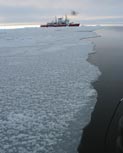Grad research: Carbon cycles on ice
Grad research: Carbon cycles on ice McGill University
User Tools (skip):
Grad research: Carbon cycles on ice
The Arctic has become a recent focus of research interest as climate models have suggested that the Arctic will be greatly affected by global climate change. Current observations support these predictions by showing a considerable decrease in ice cover over the last four decades. Multi-year ice has thinned by about 1.3 metres and the extent of long-term ice cover has decreased by about 14 percent. The disappearing Arctic ice is thought to be a result of regional warming ultimately caused by greenhouse gas emission.

CCGS Amundsen
There are several large river systems that flow into the Arctic Ocean, strongly affecting circulation, ice formation and nutrient concentration. All of these factors affect the development of the planktonic communities on continental shelves, where the majority of primary production takes place in the Arctic Ocean. The planktonic community is important to the carbon cycle as these "primary producers" sequester carbon dioxide to produce biomass. They also form the base of the Arctic food webs, leading ultimately to top carnivores, such as polar bears and humans.
The objectives of the research are to study the annual cycle of development of the plankton ecosystem in three areas on the Mackenzie Shelf: Lake Mackenzie (a region at the mouth of the river confined by ice wall), the nearby Cape Bathurst polynya and the edge of the Arctic ice pack. The results of this research can be used to improve the predictions made by global climate models.
My research is conducted on the Canadian Coast Guard Ship Amundsen, from which water samples are collected from the ocean and analyzed for their elemental composition of several nutrients. I also made primary production estimates by adding stable isotopes to water samples, incubating them for a short time and analyzing the incorporation of the isotopes into the planktonic biomass.
Life on the ship is very interesting. Because CASES is such a large endeavour, there were researchers from all over the globe, all with different ideas and views on everything from sports to world politics, and speaking many different languages, but we all had at least one thing in common: the current research. It's not only a great learning experience for academics, but by living in close quarters for a long period of time, you also learn a lot about the people you're working with and yourself. The long work hours sometimes pale in comparison to the extreme weather, which can easily damage equipment and be very physically draining. There were several times when the extreme cold caused my incubators to freeze up. It wasn't all work: on special occasions research was suspended - for example to watch the Grey Cup, or to have a small Halloween party, or even just for a morale-boosting game of soccer on the ice. (How many people can say they have played soccer on the Arctic Ocean?) Spending time aboard the Amundsen was an incredible experience, and one I will never forget. It's not very often that you get to travel from port in Quebec City to the Beaufort Sea and witness some of Canada's beautiful scenery.
Kyle Simpson, currently pursuing a master's in biology under the supervision of Neil Price, spent three months last year in the Canadian Arctic aboard the Canadian Coast Guard Ship Amundsen. His research on nitrogen cycling on the Mackenzie Shelf is part of a large interdisciplinary study, CASES (the Canadian Arctic Shelf Exchange Study). He returned to the Arctic on May 12 for three more months to complete the field research portion of his degree.
You can contact Kyle at kyle.simpson@mail.mcgill.ca or find more information or updates on CASES at www.cases.quebec-ocean.ulaval.ca.
